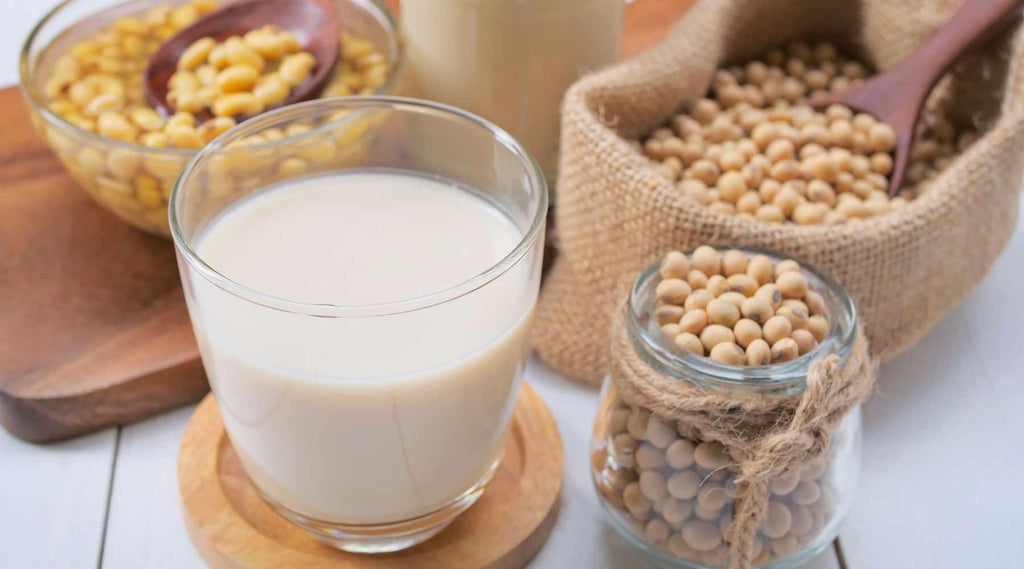
For as long as any of us can remember, milk has been used as nourishment, to enhance coffee drinks, in smoothies, in cereal bowls, in recipes, and so much more.
History has dictated that cow’s milk is not only healthy, but essential. However, upon further scrutiny - and with more research - we’ve come to realize that not only is cow’s milk not healthy for human consumption; it may be detrimental.
Soya milk has been around for many years and has been a great alternative to cow’s milk. In fact, it’s the OG dairy-free milk. It came on the market before almond milk, coconut milk, cashew milk, flax milk, potato milk (we know, surprising, but it’s a thing), and it will likely be around for a long time to come.
What is Soya Milk?
But what exactly is soya milk? Where does it come from, and how is it made? Luckily for you, dear reader, we have those answers and more, right here.
Soya milk comes from soybeans, and is made by soaking and grinding the soybeans, boiling the mixture and filtering out the particulates. It’s a stable mixture of water, oil and protein. It originated in China, and contrary to some popularly-held but false beliefs, it’s actually quite healthy for human consumption.
So, what exactly are these myths about soya milk? Glad you asked.
Nutritional Value of Soya Milk
Before we go into the myths and benefits of Soya Milk, let’s break down its nutritional value.
A cup (243ml serving) of a generic unsweetened commercial nutrient-fortified brand of soya milk provides 80 calories from 4g of carbohydrates (including 1g of sugar), 4g of fat and 7g of protein.
This soy milk contains appreciable levels of vitamin A, B vitamins, and vitamin D in a range of 10 to 45% of the Daily Value, with calcium and magnesium also in significant content.
Myths and benefits of Soya Milk
For as long as we’ve been vegan, we’ve heard an absurd amount of questions regarding protein, our overall health, and so much more, but the ones that actually had us stumped for some time until we did the research ourselves were about Tofu and Soya milk. Since both products come from soybeans, we’ll address 3 myths since they pertain to both of them.
Myth #1: Consuming soy products will make men grow breasts, and cause a hormonal imbalance in women.
This myth comes from the fact that soy products contain phyto-estrogen, which, contrary to popular belief, does not typically have a negative impact on our hormones.
The truth is that phyto means ‘plant’. Soy products contain isoflavones, which are plant estrogens that actually block cholesterol receptors in our human cells and act as antioxidants, making them very healthy for us to consume.
“Yeah, but I had a buddy who drank 6-8 soy lattes every day, and he grew boobs. What about him?” 6-8 lattes with any milk at all will likely put you in a calorie surplus, which causes weight gain. That’s what contributes to the excess fat in your friend’s breasts.
There have only been 2 documented medical cases of gynecomastia in men (men growing breast tissue) and both were attributed to massive amounts of soy being consumed - way more than the RDA. As with everything in life, moderation is key.
Cow’s milk actually contains animal hormones which can and do interact with our endocrine system. Cow’s milk is meant to grow a baby calf into a full grown cow in the shortest amount of time possible, and has been shown to increase your chances of developing breast cancer and prostate cancer by over 30%. The same can definitely NOT be said for Soya Milk.
Myth #2: Soy is not a complete protein - our body can’t use plant proteins
This has been scientifically proven as false for a long time now. Plant-based proteins are not only suitable for human consumption, they are fully absorbed and used by our bodies as well.
There are 20 amino acids that we need. Of those 20, we are able to produce 11 of them, leaving 9 essential amino acids that we need to consume as protein. While not all plant protein sources contain the optimal amount of the 9 essential amino acids, Soya Milk - and soy products in general - DO in fact contain all 9 essential amino acids, and make for a phenomenal source of protein.
Myth #3: Soy products are heavily processed and not healthy
OK, while some soy products can be processed, not all of them are. The one point we will concede is that a lot of soy crops have been genetically modified. While not everyone worries about GMOs, and the science so far says that they’re healthy, if you are concerned about genetically modified foods, simply stick to organic tofu, soya milk and other soy products whenever possible.
The fact of the matter is that most foods apart from fresh fruit and vegetables have been processed to some degree. Just because a food has been processed doesn’t necessarily make it unhealthy. So, we guess we haven’t completely busted this myth as much as we’ve taken away the negativity around it?
Uses for Soya Milk
So, now that we’ve established that Soya Milk is not only a healthier alternative to dairy milk, and that it won’t make you grow breasts or throw off your hormonal balance, what’s the best way to consume Soya Milk? Well, the same way that you’ve been using other milks.
Soya milk is great in coffee, cereal, recipes, or even if you just feel like drinking a tall cold glass of protein-packed milk.
And That’s a Wrap
Well, there you have it. Soya milk is not only not unhealthy, it’s also delicious, nutrient-dense and packed full of protein, making it quite healthy! Go on and grab a carton today to see what I’m talking about!




